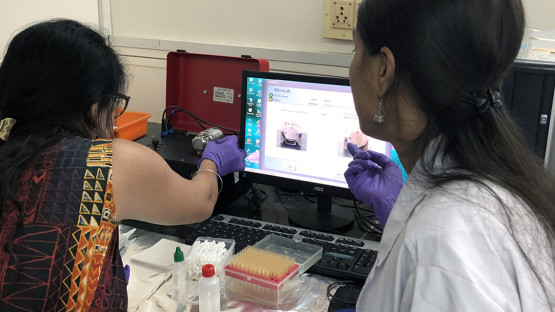Bangalore, India – Scientists, nutrition and health professionals from India, Bangladesh, Nepal, Sri Lanka and Uganda gathered at the St. John’s Research Institute (SJRI) in Bangalore, India, from 13 – 24 January 2020 for the 11th edition of the Bangalore Boston Nutrition Collaborative (BBNC). For the first time since its inception, BBNC held designated sessions on the use of stable isotope techniques in nutrition, benefitting students, associate professors, research officers and data analysts.
The BBNC was established in 2010 as a partnership between nutrition scientists at SJRI, which is an IAEA Collaborating Centre in nutrition, the Harvard TH Chan School of Public Health (HSPH) and Tufts University Schools of Medicine and Nutrition in Boston for nutrition research and training. Since then, more than 500 scientists have been trained.
Cornelia Loechl, Head of the Nutritional and Health-related Environmental Studies Section at the IAEA, highlighted the use of stable isotope techniques for the assessment of body composition, exclusive breastfeeding, total vitamin A body pools, iron absorption, energy expenditure, environmental enteric dysfunction and in cancer. She presented the role of the IAEA in nutrition programmes, and course participants had the opportunity to get hands-on experience in the laboratories of the Department of Nutrition at SJRI.
“The inclusion of stable isotope technology instructions – both lectures and hands on experience – in this year’s course has allowed attendees to apply these methods to the many nutritional problems they are tackling at their home institutions,” said course co-director Christopher Duggan, a Professor at the Departments of Nutrition and Global Health and Population at HSPH. “In countries in South Asia and sub-Saharan Africa, these approaches are critical to address acute and chronic nutritional diseases.”
The courses at BBNC are designed to explore the role of nutritional factors and health outcomes and to provide substantive knowledge in topic areas related to public health nutrition research. The courses aim to enhance methodological skills in areas of nutritional, infectious and chronic diseases epidemiology and integrate research findings to inform public health recommendations as well as programme design and implementation.
“The BBNC trains the participants in planning research from lab to field,” said Rebecca Kuriyan Raj, Head of the Division of Nutrition at SJRI and course co-director. “We are happy to offer this opportunity to IAEA project counterparts from different regions in the future.”
This course presents a unique opportunity in the future for participants in IAEA nutrition projects to enhance their skills in nutrition research methods, gain preliminary insight into stable isotope techniques and understand their multiple applications by visiting the facilities at SJRI, Loechl said.
St. John's Research Institute was designated as the first IAEA Collaborating Centre in Nutrition in 2010. The designation for another four years was approved in late 2019. With a focus on nutrition as well as on infectious and lifestyle-related diseases, the Institute uses stable isotope techniques for nutrition-related research and programme evaluation.




